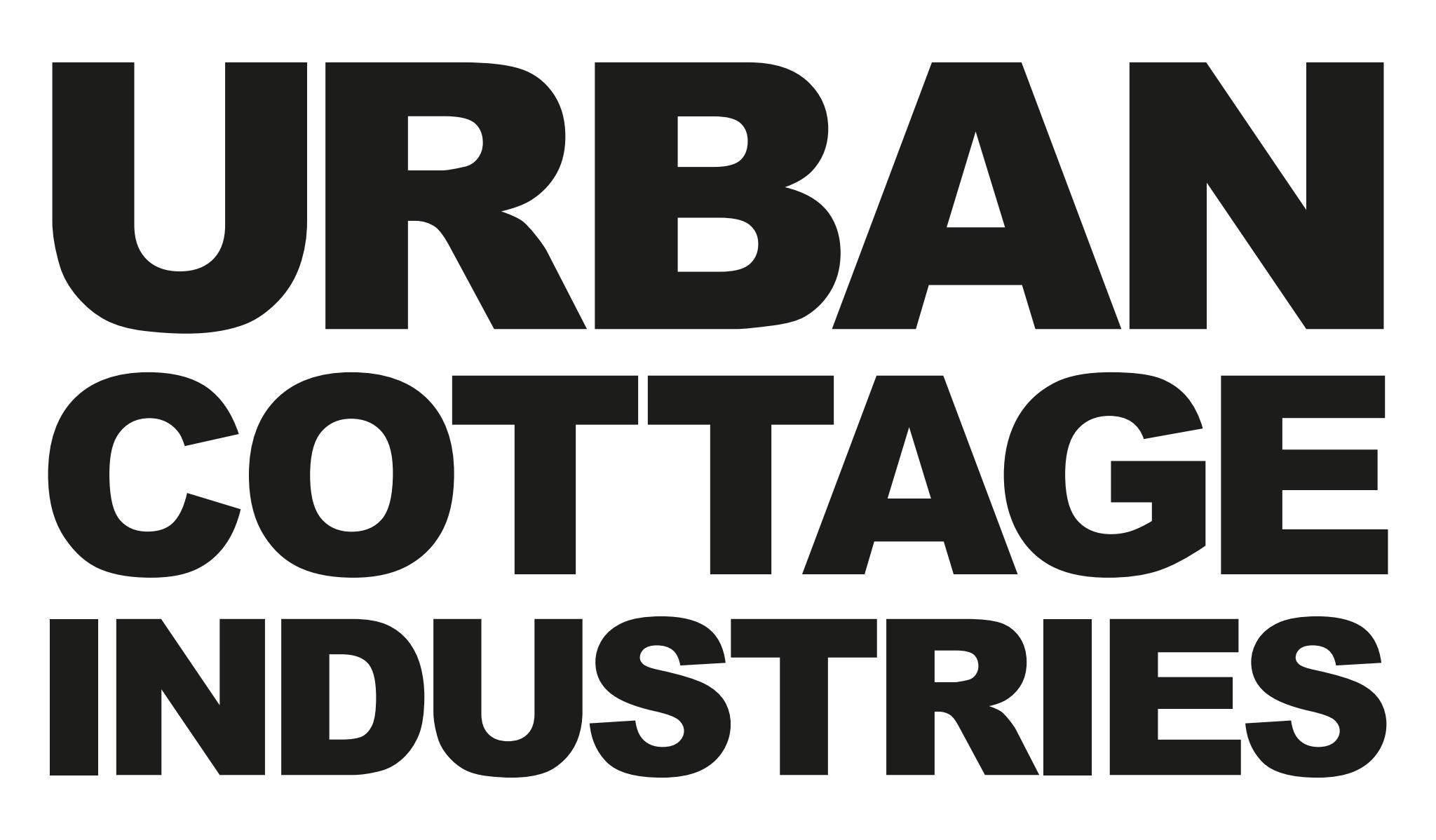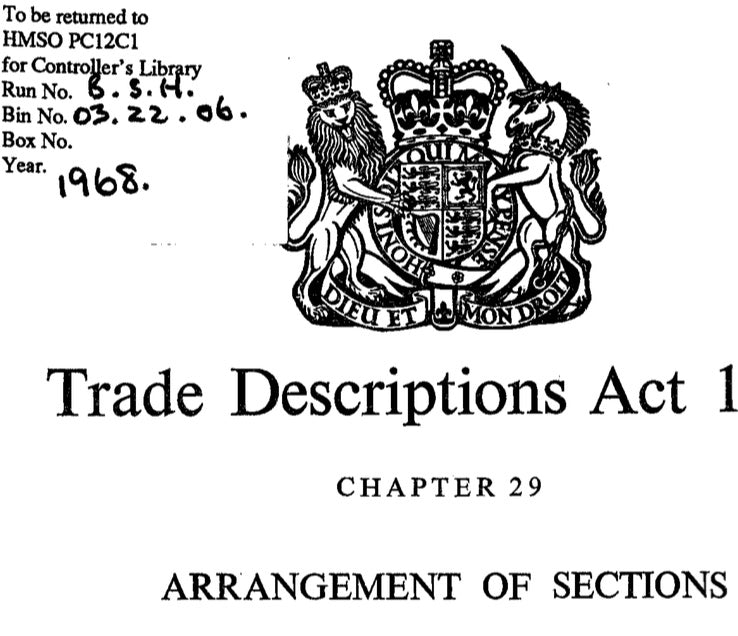This is part one of a two-part post on the origin marking of products. It looks at why country of origin information is important, the law in the UK on origin marking, the possible legal consequences of making incorrect claims about the origin of products, and finally why origin marking is not as simple as it might seem.
It's a long post because we've spent a lot of time trying to work out how we should origin mark Factorylux products. To skip straight to the conclusion go to part two of the post for an explanation of what the four origin statements made in relation to Factorylux products mean.
 There's a substantial body of research showing that country of origin affects consumer evaluation of products, and this in turn affects purchasing decisions. Consumers treat 'Made in ...' information as a signifier of quality and are more likely to select and pay more for a product made in a desirable location. Given the importance consumers place on origin marking, it's unfortunate that there's no agreed or enforced method of working out where a product comes from.
Origin marking is also important for international trade - most countries and trading blocks have tariffs or customs duties which depend on the source of the product. At one end of the spectrum, the country of an origin of goods may operate as an absolute bar to import, and at the other end make them free from all duties and restrictions.
There's a substantial body of research showing that country of origin affects consumer evaluation of products, and this in turn affects purchasing decisions. Consumers treat 'Made in ...' information as a signifier of quality and are more likely to select and pay more for a product made in a desirable location. Given the importance consumers place on origin marking, it's unfortunate that there's no agreed or enforced method of working out where a product comes from.
Origin marking is also important for international trade - most countries and trading blocks have tariffs or customs duties which depend on the source of the product. At one end of the spectrum, the country of an origin of goods may operate as an absolute bar to import, and at the other end make them free from all duties and restrictions.
 Commercial practices are widely defined to include: 'any act, omission, course of conduct, representation or commercial communication (including advertising and marketing) by a trader, which is directly connected with the promotion, sale or supply of a product to or from consumers, whether occurring before, during or after a commercial transaction in relation to a product.'
Regulation 3 prohibits unfair commercial practices. As to what is unfair, there are practices listed in Schedule 1 which are always and automatically unfair, for example falsely claiming that a product is able to cure illnesses. There are also several further umbrella definitions of unfair practices including: those that distort or are likely to distort the economic behaviour of the average consumer with regard to a product, and those that are misleading actions. Misleading actions involve making false claims about the characteristics of the product, and the geographical or commercial origin of the product is expressly included as a characteristic.
Where a trader or business makes a false claim about the origin of a product, it is likely to be an unfair commercial practice because it distorts consumer behaviour (the decision whether to buy and at what price) and it's also misleading.
Engaging as a trader in conduct which is unfair is an offence and the maximum penalties are a £5,000 fine or two years' imprisonment. Where offences are committed by companies, the company is liable as are individual directors and officers where they've consented or connived to the unfair practice or are negligent in preventing it happening. There are some due diligence defences including where the trader can prove the offence was committed by mistake, by accident or causes beyond his control.
There have been several high profile prosecutions under the Consumer Regulations and, while each one turns on its particular facts, it's clear the Regulations won't be interpreted in a narrow or technical way. The inevitable conclusion is that traders and businesses commit a criminal offence by knowingly making a factually incorrect claim in relation to the country a product was made in.
Commercial practices are widely defined to include: 'any act, omission, course of conduct, representation or commercial communication (including advertising and marketing) by a trader, which is directly connected with the promotion, sale or supply of a product to or from consumers, whether occurring before, during or after a commercial transaction in relation to a product.'
Regulation 3 prohibits unfair commercial practices. As to what is unfair, there are practices listed in Schedule 1 which are always and automatically unfair, for example falsely claiming that a product is able to cure illnesses. There are also several further umbrella definitions of unfair practices including: those that distort or are likely to distort the economic behaviour of the average consumer with regard to a product, and those that are misleading actions. Misleading actions involve making false claims about the characteristics of the product, and the geographical or commercial origin of the product is expressly included as a characteristic.
Where a trader or business makes a false claim about the origin of a product, it is likely to be an unfair commercial practice because it distorts consumer behaviour (the decision whether to buy and at what price) and it's also misleading.
Engaging as a trader in conduct which is unfair is an offence and the maximum penalties are a £5,000 fine or two years' imprisonment. Where offences are committed by companies, the company is liable as are individual directors and officers where they've consented or connived to the unfair practice or are negligent in preventing it happening. There are some due diligence defences including where the trader can prove the offence was committed by mistake, by accident or causes beyond his control.
There have been several high profile prosecutions under the Consumer Regulations and, while each one turns on its particular facts, it's clear the Regulations won't be interpreted in a narrow or technical way. The inevitable conclusion is that traders and businesses commit a criminal offence by knowingly making a factually incorrect claim in relation to the country a product was made in.
 As noted above, in the UK there are no prescriptive legal rules about determining the origin of a product to match the clear criminal penalties and civil remedies for wrongly describing goods.
A 'substantial transformation' requirement is widely recognised internationally and accords with section 36 of the the Trade Descriptions Act 1968 - 'goods shall be deemed to have been manufactured or produced in the country in which they last underwent a treatment or process resulting in a substantial change'. But what does 'substantial' mean? Does it mean anything more than a minor change - in which case the bar is set very low. Or something more substantial? In addition to the 'substantial transformation' requirement, origin can be assessed on 'value added' basis - goods originate from the place where the processes which most their value takes place. And it can also be defined by certain manufacturing or processing operations on a product by product basis - for example the origin of clothing is defined by where it is tailored rather than from where the fabric originates.
Factorylux initially tried to resolve origin marking by looking at where most of the labour input takes place - a sort of Adam Smith/Karl Marx 'Labour Theory of Value' approach to origin marking. But this raised intractable problems in relation to measuring the various inputs. Is labour measured by time or cost? If it's cost, products which are mostly made in low-wage economies end up attributed to a high-wage economy because of how labour input is valued. Equally problematic was mechanisation - highly mechanised processes with low labour inputs mean the assessed country of origin doesn't match the common sense country of origin.
In part two of the post we explain how Factorylux resolved the origin marking issues in a way which is simple, pragmatic, transparent and complies with the letter and spirit of the law.
As noted above, in the UK there are no prescriptive legal rules about determining the origin of a product to match the clear criminal penalties and civil remedies for wrongly describing goods.
A 'substantial transformation' requirement is widely recognised internationally and accords with section 36 of the the Trade Descriptions Act 1968 - 'goods shall be deemed to have been manufactured or produced in the country in which they last underwent a treatment or process resulting in a substantial change'. But what does 'substantial' mean? Does it mean anything more than a minor change - in which case the bar is set very low. Or something more substantial? In addition to the 'substantial transformation' requirement, origin can be assessed on 'value added' basis - goods originate from the place where the processes which most their value takes place. And it can also be defined by certain manufacturing or processing operations on a product by product basis - for example the origin of clothing is defined by where it is tailored rather than from where the fabric originates.
Factorylux initially tried to resolve origin marking by looking at where most of the labour input takes place - a sort of Adam Smith/Karl Marx 'Labour Theory of Value' approach to origin marking. But this raised intractable problems in relation to measuring the various inputs. Is labour measured by time or cost? If it's cost, products which are mostly made in low-wage economies end up attributed to a high-wage economy because of how labour input is valued. Equally problematic was mechanisation - highly mechanised processes with low labour inputs mean the assessed country of origin doesn't match the common sense country of origin.
In part two of the post we explain how Factorylux resolved the origin marking issues in a way which is simple, pragmatic, transparent and complies with the letter and spirit of the law.
Why is origin marking important?
 There's a substantial body of research showing that country of origin affects consumer evaluation of products, and this in turn affects purchasing decisions. Consumers treat 'Made in ...' information as a signifier of quality and are more likely to select and pay more for a product made in a desirable location. Given the importance consumers place on origin marking, it's unfortunate that there's no agreed or enforced method of working out where a product comes from.
Origin marking is also important for international trade - most countries and trading blocks have tariffs or customs duties which depend on the source of the product. At one end of the spectrum, the country of an origin of goods may operate as an absolute bar to import, and at the other end make them free from all duties and restrictions.
There's a substantial body of research showing that country of origin affects consumer evaluation of products, and this in turn affects purchasing decisions. Consumers treat 'Made in ...' information as a signifier of quality and are more likely to select and pay more for a product made in a desirable location. Given the importance consumers place on origin marking, it's unfortunate that there's no agreed or enforced method of working out where a product comes from.
Origin marking is also important for international trade - most countries and trading blocks have tariffs or customs duties which depend on the source of the product. At one end of the spectrum, the country of an origin of goods may operate as an absolute bar to import, and at the other end make them free from all duties and restrictions.
What's the law on origin marking?
Unlike some jurisdictions, the UK has no law - Act of Parliament or secondary legislation - which generally requires products to be origin marked. The exception to this is food which is required to be origin marked under EU Regulation 1169/2011. Although origin marking for all products other than food is voluntary, anyone who shops in the UK will be accustomed to seeing a range of products labelled, stamped or otherwise marked with their country of origin. In addition to origin marking being voluntary, there are no detailed or prescriptive rules for working out the origin of a product. The nearest the law comes to prescribing rules is section 36 of the Trade Descriptions Act 1968 which states 'goods shall be deemed to have been manufactured or produced in the country in which they last underwent a treatment or process resulting in a substantial change'. However the status and effect of this provision is unclear since most of the other provisions of the Act have been repealed (including the offences for breaching section 36) and there are no decided cases on the meaning of 'substantial'. While origin marking is voluntary and there are no detailed rules for working out the country of origin of a product, the law is clear in relation to sanctions for false or misleading or claims of origin.The criminal law on false origin claims
For many years the applicable law was the Trade Descriptions Act 1968, but since May 2008 the law for consumer purchases has been the Consumer Protection from Unfair Trading Regulations 2008 (the Consumer Regulations). The relevant law for business purchases is the Business Protection from Misleading Marketing Regulations 2008 (the Business Regulations). The focus here is on the Consumer Regulations because they are more onerous than the Business Regulations and we strive to meet the letter and spirit of the Consumer Regulations for all customers, whether individuals or trade. The Consumer Regulations are not the easiest piece of legislation to decipher, but the key concept is that of 'unfair commercial practices'. Commercial practices are widely defined to include: 'any act, omission, course of conduct, representation or commercial communication (including advertising and marketing) by a trader, which is directly connected with the promotion, sale or supply of a product to or from consumers, whether occurring before, during or after a commercial transaction in relation to a product.'
Regulation 3 prohibits unfair commercial practices. As to what is unfair, there are practices listed in Schedule 1 which are always and automatically unfair, for example falsely claiming that a product is able to cure illnesses. There are also several further umbrella definitions of unfair practices including: those that distort or are likely to distort the economic behaviour of the average consumer with regard to a product, and those that are misleading actions. Misleading actions involve making false claims about the characteristics of the product, and the geographical or commercial origin of the product is expressly included as a characteristic.
Where a trader or business makes a false claim about the origin of a product, it is likely to be an unfair commercial practice because it distorts consumer behaviour (the decision whether to buy and at what price) and it's also misleading.
Engaging as a trader in conduct which is unfair is an offence and the maximum penalties are a £5,000 fine or two years' imprisonment. Where offences are committed by companies, the company is liable as are individual directors and officers where they've consented or connived to the unfair practice or are negligent in preventing it happening. There are some due diligence defences including where the trader can prove the offence was committed by mistake, by accident or causes beyond his control.
There have been several high profile prosecutions under the Consumer Regulations and, while each one turns on its particular facts, it's clear the Regulations won't be interpreted in a narrow or technical way. The inevitable conclusion is that traders and businesses commit a criminal offence by knowingly making a factually incorrect claim in relation to the country a product was made in.
Commercial practices are widely defined to include: 'any act, omission, course of conduct, representation or commercial communication (including advertising and marketing) by a trader, which is directly connected with the promotion, sale or supply of a product to or from consumers, whether occurring before, during or after a commercial transaction in relation to a product.'
Regulation 3 prohibits unfair commercial practices. As to what is unfair, there are practices listed in Schedule 1 which are always and automatically unfair, for example falsely claiming that a product is able to cure illnesses. There are also several further umbrella definitions of unfair practices including: those that distort or are likely to distort the economic behaviour of the average consumer with regard to a product, and those that are misleading actions. Misleading actions involve making false claims about the characteristics of the product, and the geographical or commercial origin of the product is expressly included as a characteristic.
Where a trader or business makes a false claim about the origin of a product, it is likely to be an unfair commercial practice because it distorts consumer behaviour (the decision whether to buy and at what price) and it's also misleading.
Engaging as a trader in conduct which is unfair is an offence and the maximum penalties are a £5,000 fine or two years' imprisonment. Where offences are committed by companies, the company is liable as are individual directors and officers where they've consented or connived to the unfair practice or are negligent in preventing it happening. There are some due diligence defences including where the trader can prove the offence was committed by mistake, by accident or causes beyond his control.
There have been several high profile prosecutions under the Consumer Regulations and, while each one turns on its particular facts, it's clear the Regulations won't be interpreted in a narrow or technical way. The inevitable conclusion is that traders and businesses commit a criminal offence by knowingly making a factually incorrect claim in relation to the country a product was made in.
The civil law on false origin claims
In relation to the civil law, false statements of fact about origin are potential misrepresentations - for example where a seller claims a product is made in one country and it is actually made somewhere else. Misrepresentations are actionable where the false statement is intended and actually does help induce a person to enter to contract. There are several potential remedies for misrepresentation:- The seller will usually be able to rescind the contract. The parties are put back as though the contract had never existed - the product is returned to the seller and the buyer gets a full refund.
- The seller may also be able to claim damages - usually the difference between the actual value and the value had the representation been true. Where the misrepresentation was fraudulent (the seller knew the statement was false or was reckless as to whether it was true) or negligent (the seller did not have reasonable grounds to believe the statement was true), there is a right to damages. Damages are not normally available where the misrepresentation was innocent (the seller had reasonable grounds to believe the statement was true) but may be available as an alternative to recission.
Why is difficult to get origin marking right?
The legal risks faced by traders and businesses in relation to origin marking are clear - making factually incorrect statements about the origin of a product opens the possibility of criminal penalties and civil remedies. Although it's important to get origin marking right, it's not always straightforward to give clear and simple origin information. There are several aspects to the problem. The first is that as product complexity, manufacturing specialism and globalisation grow, it becomes genuinely difficult to say a product is made in a specific country or place. Raw materials and components can be sourced from around the world and assembly may take place at various locations. Even apparently simple products have components from, and undergo manufacturing processes in, several countries. As noted above, in the UK there are no prescriptive legal rules about determining the origin of a product to match the clear criminal penalties and civil remedies for wrongly describing goods.
A 'substantial transformation' requirement is widely recognised internationally and accords with section 36 of the the Trade Descriptions Act 1968 - 'goods shall be deemed to have been manufactured or produced in the country in which they last underwent a treatment or process resulting in a substantial change'. But what does 'substantial' mean? Does it mean anything more than a minor change - in which case the bar is set very low. Or something more substantial? In addition to the 'substantial transformation' requirement, origin can be assessed on 'value added' basis - goods originate from the place where the processes which most their value takes place. And it can also be defined by certain manufacturing or processing operations on a product by product basis - for example the origin of clothing is defined by where it is tailored rather than from where the fabric originates.
Factorylux initially tried to resolve origin marking by looking at where most of the labour input takes place - a sort of Adam Smith/Karl Marx 'Labour Theory of Value' approach to origin marking. But this raised intractable problems in relation to measuring the various inputs. Is labour measured by time or cost? If it's cost, products which are mostly made in low-wage economies end up attributed to a high-wage economy because of how labour input is valued. Equally problematic was mechanisation - highly mechanised processes with low labour inputs mean the assessed country of origin doesn't match the common sense country of origin.
In part two of the post we explain how Factorylux resolved the origin marking issues in a way which is simple, pragmatic, transparent and complies with the letter and spirit of the law.
As noted above, in the UK there are no prescriptive legal rules about determining the origin of a product to match the clear criminal penalties and civil remedies for wrongly describing goods.
A 'substantial transformation' requirement is widely recognised internationally and accords with section 36 of the the Trade Descriptions Act 1968 - 'goods shall be deemed to have been manufactured or produced in the country in which they last underwent a treatment or process resulting in a substantial change'. But what does 'substantial' mean? Does it mean anything more than a minor change - in which case the bar is set very low. Or something more substantial? In addition to the 'substantial transformation' requirement, origin can be assessed on 'value added' basis - goods originate from the place where the processes which most their value takes place. And it can also be defined by certain manufacturing or processing operations on a product by product basis - for example the origin of clothing is defined by where it is tailored rather than from where the fabric originates.
Factorylux initially tried to resolve origin marking by looking at where most of the labour input takes place - a sort of Adam Smith/Karl Marx 'Labour Theory of Value' approach to origin marking. But this raised intractable problems in relation to measuring the various inputs. Is labour measured by time or cost? If it's cost, products which are mostly made in low-wage economies end up attributed to a high-wage economy because of how labour input is valued. Equally problematic was mechanisation - highly mechanised processes with low labour inputs mean the assessed country of origin doesn't match the common sense country of origin.
In part two of the post we explain how Factorylux resolved the origin marking issues in a way which is simple, pragmatic, transparent and complies with the letter and spirit of the law.




Leave a comment
This site is protected by hCaptcha and the hCaptcha Privacy Policy and Terms of Service apply.